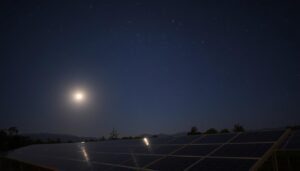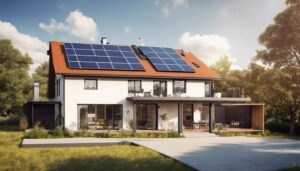A 7 kW solar system can potentially cover your household's energy needs, but it ultimately depends on your average daily energy consumption. Larger families or households with multiple appliances may require more energy. You'll need to assess your energy usage patterns, ideally by reviewing your monthly energy bills, and consider factors like roof space, orientation, and local building codes. A well-designed 7 kW system can generate 28-35 kWh/day, but you may need to evaluate battery integration options for energy security. As you explore the feasibility of a 7 kW system, understanding the factors that impact its effectiveness will help you make an informed decision.
Understanding Your Energy Needs
Understanding your household's energy needs is essential when deciding if a 7 kW solar system is enough to run your home. To determine this, you'll want to assess your energy efficiency and consumption habits.
Take a look at your monthly energy bills to see your average daily consumption. Do you have a large family or multiple appliances that consume a lot of energy? If so, you may need more than a 7 kW system.
On average, a typical household consumes between 12 to 22 kWh per day. A 7 kW solar system generates approximately 28-35 kWh per day, which should cover this demand.
However, monitoring your energy usage patterns and peak usage times will help you make a more informed decision.
Assessing Your Home's Suitability
When evaluating your home's suitability for a 7 kW solar system, it's essential to contemplate your energy consumption patterns.
Are your daily energy needs consistent with the average household, or do you use considerably more or less energy? To determine this, you'll need to examine your past energy bills and evaluate the solar system requirements, including the necessary roof space and number of panels needed for peak performance.
Energy Consumption Patterns
A key factor in determining whether a 7 kW solar system is enough to run your house is evaluating your home's energy consumption patterns.
You'll need to assess your energy usage trends, including peak usage times and seasonal variations. Are there periods when you use more energy, such as during winter or summer?
Do you notice changes in your energy consumption based on the time of day? Evaluating these patterns will help you determine if a 7 kW system can meet your energy needs.
You'll also want to reflect on how your energy usage might change over time, such as if you plan to add more family members or upgrade to energy-intensive appliances.
Solar System Requirements
Now that you've evaluated your home's energy consumption patterns, it's time to assess your home's suitability for a 7 kW solar system. Consider factors like roof orientation and angle, as north-facing roofs generally provide the best results regarding sunlight exposure. You'll need approximately 40-48 square meters of roof space, depending on the panel wattage and arrangement.
| Consideration | Ideal | Challenges |
|---|---|---|
| Roof orientation | North-facing | Shading from nearby trees or buildings |
| Roof space | 40-48 square meters | Limited space due to obstructions |
| Solar panel types | High-efficiency panels | Higher upfront costs for premium panels |
Before proceeding, check if you need installation permits and assess your local building codes. Verify you're aware of the requirements and regulations in your area to avoid any potential issues.
Solar Panel Efficiency and Size
Considering the space on your roof, it's essential to evaluate the efficiency and size of the solar panels needed for a 7 kW system.
The type of panel you choose will greatly impact the installation space required. Standard residential solar panels measure about 5 feet tall by 3 feet wide.
However, higher efficiency panels, such as the Q Cells Q.MAXX BLK-G4+ with a 20.8% efficiency rating, can reduce the number of panels needed, maximizing energy output while minimizing the installation area needed on the roof.
Will you opt for standard panels or high-efficiency ones? This decision will influence the total area requirement, which is approximately 330 to 405 square feet for a standard 7 kW system.
Installation Considerations and Costs
Your solar panel choice in mind, it's time to think about the installation process itself. This involves securing the necessary installation permits before work can begin. The installation timeline is usually short, typically lasting 1-3 days. Here's a breakdown of the average costs for a 7 kW solar system in different regions:
| Location | Number of Panels | Average Cost |
|---|---|---|
| Florida | 20-27 | $23,240 |
| Australia | 22 | $7,440 |
| Other regions | Varies | Varies |
These costs may vary, but it's crucial to factor them into your decision. You'll also want to guarantee your roof is suitable for the installation, with a proper orientation and angle to maximize energy production.
Evaluating Battery Integration Options
As you consider a 7 kW solar system for your home, it's essential to explore battery integration options to maximize energy security.
You'll need to evaluate various battery storage options, such as the SonnenBatterie Evo, to determine which one best suits your energy needs and provides a reliable backup power system.
Will a battery system with a capacity of 28-35 kWh be enough to meet your household's energy consumption patterns and keep the lights on during nighttime or outages?
Battery Storage Options
A 7 kW solar system can generate a substantial amount of energy, but it's the battery storage system that truly reveals its full potential.
When reviewing battery options, you'll need to contemplate various battery types, such as lithium-ion or lead-acid, and their respective installation locations. Most battery systems require additional room and may need to be placed indoors or in a garage. Evaluating available space for installation is essential.
For instance, batteries like the SonnenBatterie Evo can store enough energy to power essential appliances in a typical home for several hours or even days.
Energy Security Benefits
Most homes can remarkably enhance their energy security by integrating a battery storage system with a 7 kW solar system.
By storing excess energy generated during the day, you can guarantee a steady power supply at night or during outages. This not only improves energy independence but also allows you to take advantage of time-of-use rates by using stored energy during peak pricing hours.
Properly sizing the battery system, considering factors like battery longevity and energy resilience, is key to peak performance.
A well-designed system can considerably enhance financial returns by maximizing self-consumption rates and reducing reliance on grid electricity.
Will you consider integrating battery storage with your 7 kW system to boost your energy security?
Backup Power Systems
With energy security benefits in mind, you're likely considering how to further fortify your 7 kW solar system against power outages and disruptions.
Battery integration is a viable solution, and it's essential to evaluate your options carefully. A well-sized battery system, such as 10 kWh or more for a home consuming around 17 kWh per day, can provide backup power during outages and nighttime usage.
When choosing a battery system, consider battery longevity and backup strategies to guarantee peak performance.
Properly integrated, a 7 kW solar system and battery storage can considerably reduce your reliance on the grid.
This setup also becomes more attractive with financial incentives, such as government rebates and tax credits, which can help offset the cost of battery integration.
Long-Term Energy Savings and Benefits
When it comes to investing in solar energy, your long-term savings and benefits play a significant role in making a decision.
A 7 kW solar system can lead to significant financial returns, including estimated lifetime savings of around $12,257 over 25 years. This substantial amount can greatly enhance your overall financial returns on the initial investment.
You can expect to recoup your investment relatively quickly, with the average payback period estimated between 5-7 years.
Additionally, the installation of a 7 kW solar system can increase your property value by approximately $15,000-$20,000, contributing to long-term financial benefits.
With these benefits in mind, can a 7 kW solar system be a smart investment for your home?
Choosing the Right Solar System
Your long-term savings and benefits will greatly depend on the size and efficiency of your solar system. When choosing the right solar system for your 7 kW needs, system optimization and panel selection are essential.
Consider factors like roof orientation, available space, and energy consumption patterns to guarantee peak performance and efficiency. A professional assessment can help tailor the solar system to your specific household needs, maximizing efficiency and financial benefits.
This assessment will also consider your energy consumption patterns and potential future energy needs. By choosing the right solar system, you can confirm it meets both your current and long-term energy requirements, providing you with maximum savings and benefits.
A well-designed system can make all the difference in your energy savings and overall satisfaction.
Frequently Asked Questions
Can 7kw Power a House?
You're wondering if 7kw can power a house – it's possible with efficient home appliances and energy efficiency measures in place, as a well-designed system can nearly meet average energy needs, ensuring a comfortable home.
Is 7000 Watts Enough to Run a House?
You're wondering if 7000 watts can power a house. Considering your household appliances and energy consumption, 7000 watts can cover most needs, but high-usage homes might require more, depending on location and usage patterns.
How Much Energy Is 7 Kw?
You're producing 7 kW, which translates to 7,000 watts of energy. Considering energy consumption and power efficiency, this output can considerably impact your daily energy needs, covering around 28-35 kWh of electricity per day.
What Will a 7 Kw Generator Run?
You can power essential appliances with a 7 kW generator, covering its capacity for devices like refrigerators, lights, and furnaces, as well as some air conditioners and electric stoves in a staggered manner.
Conclusion
You've taken the first step towards understanding if a 7kW solar system is enough to run your house. Now, consider your specific energy needs, roof size, and local regulations. With the right solar panel efficiency, battery integration, and installation, you can enjoy long-term energy savings and benefits. Ask yourself: What are your current energy costs, and how can you reduce them? A professional solar assessment will help determine the perfect system for you.



